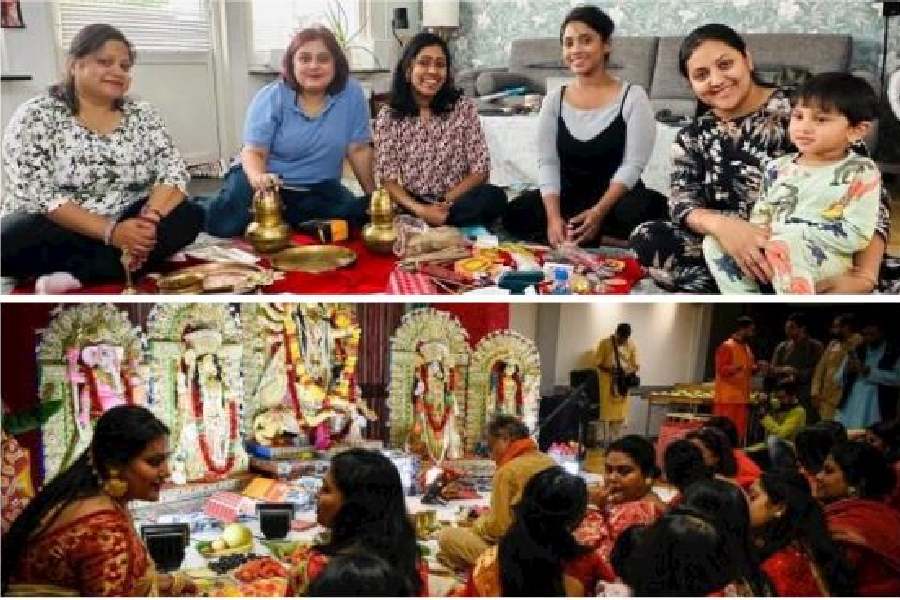The dearth of priests in a Swedish town has made the organisers chant the do-it-yourself mantra.
Five women have taken online training in conducting puja. Come October 20, these women will invoke the goddess at Medborgarhuset, a community centre in Gothenburg.
“There are about 40 families involved in our puja, which we are holding since 2018. Every year, we have to invite a priest from Stockholm. Because there are several pujas there, the few priests are never free on the exact tithi. So, we have to hold our puja the weekend before or after the prescribed days. Last year, we even thought of flying in a priest from India but it was too expensive,” said Somdeb Majumdar.
Majumdar works in Volvo, which is headquartered in Gothenburg, Sweden’s second biggest city.
This year, when the organisers resolved to hold the puja on the exact days, the priests in Stockholm said they were already booked.
The solution came from the neighbouring town of Helsingborg. “They said they were doing the puja themselves. So we floated the idea and sought volunteers,” said Majumdar.
Coincidentally, all five who rose to the challenge were women. After some initial hesitation about how the local Indian community would react to the caste and gender of priests, they decided to go ahead in a bid to become self-sustaining.
“We got in touch with Nandini Bhowmik, who has been a pioneer in Kolkata as a priestess. She tutored us virtually over five weekends about every aspect of the rituals. Earlier, we barely understood the anjali mantras,” said Ishana
Basu, chairperson of Bengali Association of Gothenburg, who is one of the volunteers.
The five are meeting every Sunday now for practice.
“I grew up seeing Durga Puja in my ancestral home. I perform puja at my home altar. It is very exciting to get to take on the role formally in public,” she said.
The puja will happen over two days, the first day being reserved for Sashthi and Saptami puja and the second for the rest. “We have decided amongst ourselves who will focus on which ritual,” said Deepannita Bose, the association secretary.
The puja ingredients have come from Kolkata. “Whoever visits home before Puja brings back everything from a dashakarma bhandar. But even in Sweden these days you get sandalwood paste, vermillion, turmeric, betel nut and even sacred thread at the Indian shops,” said Basu.
This year, a team has been formed to cook bhog. “Earlier, people used to cook items of their choice as offering. Non-Bengalis used to bring laddoo and halwa. This time, we have standardised the offerings,” said Bose.
Participation of NRIs from other linguistic communities is a hallmark of the puja.
“Marathis, south Indians and Odiyas of our town participate as well. We had to stop registration of visitors within two days as the venue reached capacity. There is no charge for darshan but we have to keep the headcount,” Bose said.
“While Swedish spouses of Bengalis have signed up as volunteers, the Marathi community has offered to do lezim dance when the dhak would play after our dhunuchi dance,” said Deepannita, a classical dancer.
Orders have been placed online for red saris for all the debutante priestesses. Deepannita admitted to being nervous.
“Nandini di has asked us to be honest in our prayers,” she smiled.
